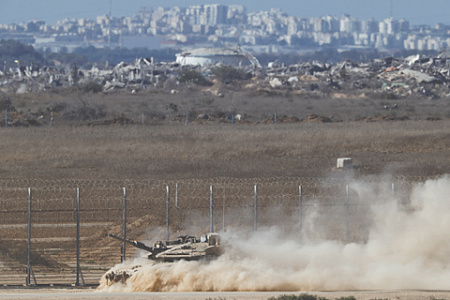
Israeli Prime Minister Benjamin Netanyahu convened his war cabinet on August 21 to finalize the technical details of a new, large-scale military operation aimed at capturing Gaza City. The move signals Israel’s resolve to push forward with its military campaign, despite a recent declaration from Hamas expressing readiness to resume talks on a partial ceasefire and the release of hostages seized on October 7, 2023. Israeli officials have reiterated their goal of dismantling the Palestinian group’s remaining capabilities.
The high-level meeting followed reports of internal discussions over the operation’s strategy, with some technical details allegedly withheld from certain ministers by Netanyahu in the initial planning stages. A particularly contentious point under consideration is whether to cut off the water supply to the active combat zone in an effort to break the resistance of Hamas’s armed wing. While the Israeli military assesses that the surface-level capture of Gaza City could be swift with a proper siege, the tactics have sparked internal debate.
The planned escalation has drawn significant concern from international organizations over the potential humanitarian fallout for the Palestinian civilian population. In response to the developments, Iran and other regional powers have requested an emergency meeting of the Organization of Islamic Cooperation (OIC) to be held in Jeddah, Saudi Arabia, with the primary focus on the escalating crisis in Gaza.
The Israel Defense Forces (IDF) began “preliminary actions” on August 20, taking control of the outskirts of Gaza City. In preparation for the next phase, the military has been authorized to issue call-up orders for approximately 60,000 reservists by early September. This mobilization, expedited from its original schedule, is also intended to support the evacuation of Palestinian civilians from the northern part of the enclave to the south.
Hamas has accused Israel of deliberately abandoning the negotiation process, stating it had agreed to the latest proposal put forth by mediators but received no response. The group asserted that the new offensive would fail and placed full responsibility for its consequences on both the Israeli government and the U.S. administration, calling on mediators to “exert maximum pressure on Israel to stop its war of extermination against the Palestinian people.”
With a full-scale siege of Gaza City expected to commence in September, questions loom over the ultimate effectiveness of renewed military pressure. Recent Israeli intelligence suggests that Hamas has been successful in rebuilding parts of its vast tunnel network, including in areas previously cleared by Israeli troops. There are growing concerns that a new offensive may only force militants deeper underground, complicating their elimination and raising doubts about achieving a decisive victory. This strategic challenge is compounded by reports of declining morale and turnout among Israeli reservists.
